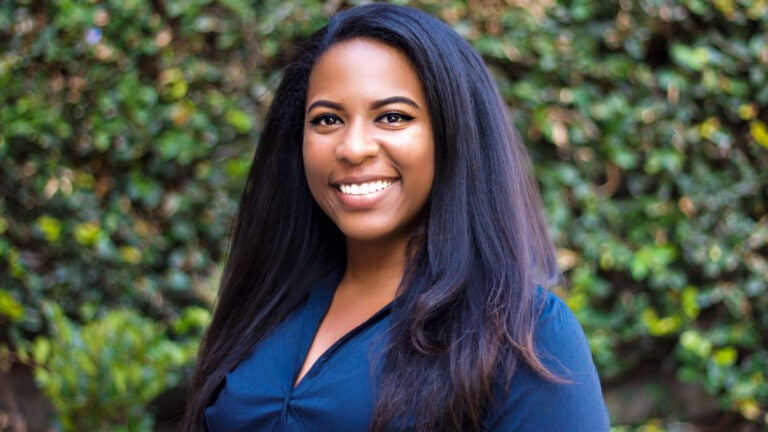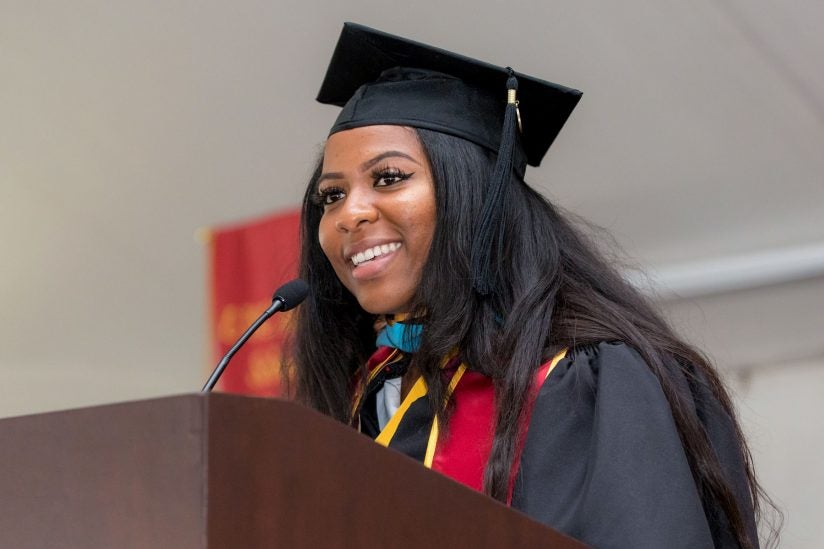
After getting her master’s degree from USC Rossier School of Education, Sarah Toutant will bring her diverse life experiences to the next chapter of her life. (Photo/Courtesy of Sarah Toutant)
A future in student affairs was right in front of her all along
How a black and Native American transracial adoptee in a white family came to embrace the path she was already on
As her senior year at the University of San Francisco was winding down, Sarah Toutant worried she hadn’t established a solid career goal. What was she going to do after graduation?
A straightforward question from her mentor brought a career path into sharp relief: “So you’ve interned for the Intercultural Center, worked at the office of admission and you were the president of the Black Student Union, right? Have you thought about a career in student affairs?”
I now tell other students not to think in terms of what they want to do in the future, but to look at what they are already doing.
Sarah Toutant
That’s when she got it. “I now tell other students not to think in terms of what they want to do in the future, but to look at what they are already doing,” Toutant said. “That’s how to find your passion.”
Toutant entered the Master of Education in Postsecondary Administration and Student Affairs (PASA) at the USC Rossier School of Education in 2016 and picked up where she had left off in college, taking on leadership roles in several student organizations, including Graduate Student Government and the Black Graduate Student Network.
Her dedication did not go unnoticed. She was named Outstanding First-Year Student by USC’s PASA Network and delivered the student address at the May 11 commencement ceremony for master’s students.
Road to studying student affairs at USC
If Toutant had been unsure about her career goal, it wasn’t for a lack of purpose. Her birth mother battled addictions and gave her up for adoption to the Toutants, as she trusted they would take good care of her. As a black and Native American transracial adoptee in a white family who grew up in a predominantly Latino community, her experiences with race have significantly impacted her journey as a black woman and scholar.

“What I like about Sarah is that she is confident, but she also makes herself vulnerable, and that’s a rare combination to find in people, let alone young students,” said Shafiqa Ahmadi, co-director of the USC Rossier Center for Education, Identity and Social Justice, who was impressed by Toutant’s take-charge approach to managing the center’s new Spoken Justice series, which creates a space for others to share personal reflections.
Toutant has spoken openly at those events about her adoption, the courage of her birth mother, her struggle with anxiety and the impact of the nation’s current political climate on students of color.
As she moves forward, she hasn’t forgotten where she comes from. Last month she attended USF’s Admitted Students Day, where she spoke to the finalists applying for the university’s new Black Scholars Program. The university had delivered on her demands and is opening a living-learning community for black students this fall.
These experiences and her identities have influenced her eagerness to research the experiences of black students while affirming her commitment to racial justice. This fall, Toutant will begin the USC Rossier PhD program in Urban Education Policy and become a research associate in the USC Race and Equity Center under the guidance of Shaun Harper, her adviser and the center’s executive director.
“Sarah’s determined — she will accomplish everything she sets her mind to,” Ahmadi said. “I cannot wait to see what she does next.”



